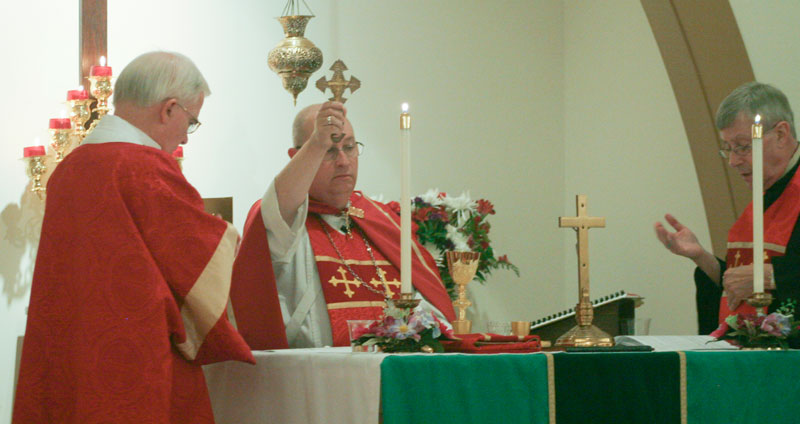
GREER—During a Sunday morning Mass at St. Rafka Maronite Mission, the words of the consecration wash over the congregation in a stream of musical, haunting syllables that are often riveting even to those who don’t understand them.
The mission’s pastor, Benedictine Father Bartholomew Leon, is chanting in Aramaic, the ancient language that was used by Jesus himself.
The Maronite liturgy includes sections in English, Arabic and Syriac, which is a version of Aramaic. That language is part of what drew Richard Wickett of Travelers Rest and his wife Kathryn Wickett to join St. Rafka, even though both of them were baptized in the Roman rite.
“It makes the consecration so very spiritual,” Mr. Wickett said. “You’re hearing those important words in the very language that Jesus spoke. It’s very moving.”
 Mrs. Wickett was drawn to the Maronite rite because of the music, which includes chanting in Arabic and the use of instruments such as the violin and the oud, a pear-shaped stringed instrument common in Middle Eastern music.
Mrs. Wickett was drawn to the Maronite rite because of the music, which includes chanting in Arabic and the use of instruments such as the violin and the oud, a pear-shaped stringed instrument common in Middle Eastern music.
The Wicketts are just one of several families who have come to St. Rafka because of its style of worship.
Founded in 2002, it hosts a remarkably diverse group of the faithful who are also drawn by the warm, rich sense of community that members have built over the years. Currently about 130 families attend.
While most members are of Lebanese descent, it also draws people from Egypt, Syria, Jordan and Israel, plus several Iraqis who have come to the United States because of the persecution of Christians. The Iraqis are Chaldean Catholics and other Middle Eastern rites are represented too, but all have found a home at St. Rafka because of a similarity to their native churches.
“I am really humbled to be part of such a diverse church and worship with people who have come to us for many different reasons,” said Mary Anne Lepak, a Lebanese American who attends St. Rafka with her family. “It’s very humbling to hear what some of the people have gone through and their trust in God is palpable. It awakens your spirit to see people getting along, especially with things the way they are in the world today.”
Maronites trace their Christian roots to early believers in the area of modern-day Syria and Lebanon. The rite’s name comes from a priest-hermit, Maron, who lived near Syria and died in the third century. His disciples founded a church and then a monastery.
 Father Leon, called “Abouna” by his flock, has faculties to celebrate the Maronite and Roman rites. He first led St. Rafka from 2003 to 2004 and took over the reins again when he returned to the diocese in 2006. He is assisted by Father Christopher Henderson, a retired Maronite priest from North Carolina who now lives in Greenville.
Father Leon, called “Abouna” by his flock, has faculties to celebrate the Maronite and Roman rites. He first led St. Rafka from 2003 to 2004 and took over the reins again when he returned to the diocese in 2006. He is assisted by Father Christopher Henderson, a retired Maronite priest from North Carolina who now lives in Greenville.
“It’s a very wonderful thing to see how all the different people who come here get along and worship together,” he said. “It’s really unique because there are really no political or cultural clashes. The people enjoy working with each other and praying with each other. They get together both at church and in their homes. It’s been wonderful to see this community grow and mature.”
St. Rafka grew out of efforts by a dedicated group of Lebanese Catholics in the Upstate who wanted to bring the Maronite rite to South Carolina. The mission first held Mass in Gallivan Hall at St. Mary Church in Greenville and other locations in the Upstate. In 2010, St. Rafka purchased its current building off S.C. Highway 14 from a Church of Christ congregation that closed. Members transformed it into a traditional Maronite worship space, including lavish Eastern carpets and ornate icons.
The mission has added social activities over the years, including Scripture study and monthly pasta suppers that attract people of all faiths.
Marlene Saad of Greenville was one of those who first organized the Maronite community, and remembers hosting dinner and dance parties with Middle Eastern food to fund the early mission’s efforts.
“It’s wonderful to see what this church has become — I know the Holy Spirit has been at work here,” she said. “We all get along and we’re like a family. I want to pinch myself when I go to Mass because it’s like a dream compared to the early days. I thank God every day.”
St. Rafka currently has three weekend Masses: a Saturday vigil at 7 p.m. and two on Sunday at 11 a.m. and 7 p.m. The mission also hosts a 7 p.m. Wednesday night liturgy that includes anointing of the sick.

